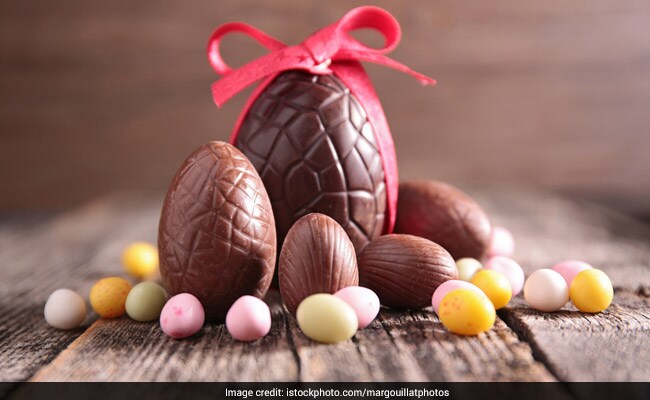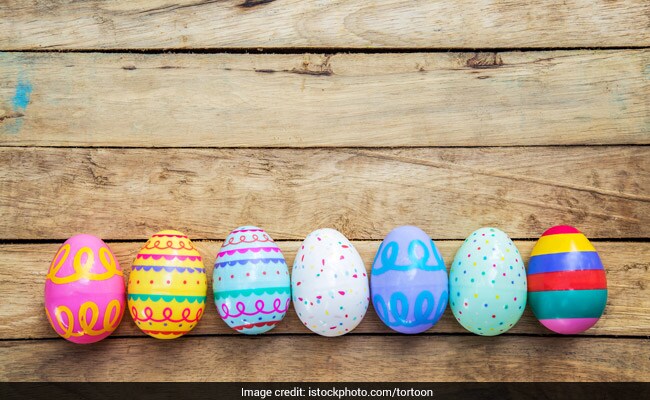
The Easter 2018 weekend is here, and we can't wait to indulge in all the festive sweet treats. This year Easter would be celebrated on 31st March 2018. Observed three days after the Good Friday, Easter is celebrated to mark the spirit of rebirth and life. While Good Friday marks the crucifixion of Jesus Christ, Easter celebrates the resurrection of Jesus from the tomb on the third day after his crucifixion. According to the legends, Christians started celebrating Easter to celebrate the resurrection of Jesus and his great sacrifice for the mankind. The festival has many motifs that symbolise new life like the tradition of making Easter eggs and Easter bunnies. Here is a brief origin of the festival and the celebrations.
(Also Read: How To Decorate Eggs This Easter?)

The word Easter has its own linguistic history of its own. It is said that the word Easter is derived from the name of an Old Goddess Eostre. In 7th to 8th-century English monk Bede noted that the month Eosturmōnaþ (that fell during March or April) was named after Goddess Eostre, in whose honour feasts were celebrated in that month. In Latin and Greek, the Christian celebration was, and still is, called Pascha. The Pascha denotes the Jewish festival known in English as Passover, commemorating the Jewish Exodus from slavery in Egypt.
The story of the Easter bunny and eggs is thought to have become popular in the 15th century. And gradually became a staple part of Easter celebrations globally. Rabbits and eggs are motifs of new life and existence, which is essentially the spirit of Easter and the resurrection.
Rabbits usually give birth to a lot of babies (kits or kittens), which symbolises a new life, connecting it to the new life of Jesus after he was crucified. Interestingly, this led to the traditions of making nests for the rabbits to lay their eggs. Eventually, nests became the decorative baskets and colourful eggs were replaced by candies, gifts and treats.
Significance Of Easter
The significance of Easter is tied to the great prophecy made in the ancient Christian scriptures. According to the prophecy, God would send a Messiah, who would be persecuted for the sins of mankind and rise on the third day. An Easter celebration has its root in the early 2nd century A.D. According to historians, the early Christians began remembering the Resurrection every Sunday following its occurrence. In A.D. 325, the Council of Nicaea set aside a special day just to celebrate the Resurrection. There was much debate as to what should be the day to celebrate Easter, as many sects were of differing thoughts. Since some wanted the celebration to be in line with events in Old Testament, and some wanted it to be dissociated with Judaism. The council laid out two rules. First was of independence of the Jewish calendar, and the second was the worldwide uniformity of the day. Through the years it was decided that the following Sunday after Good Friday would be the day to celebrate the resurrection of Christ, the saviour.(Also Read: How To Decorate Eggs This Easter?)

Easter 2018: The Easter feast is one of the most looked after feast in a Christian household.
The word Easter has its own linguistic history of its own. It is said that the word Easter is derived from the name of an Old Goddess Eostre. In 7th to 8th-century English monk Bede noted that the month Eosturmōnaþ (that fell during March or April) was named after Goddess Eostre, in whose honour feasts were celebrated in that month. In Latin and Greek, the Christian celebration was, and still is, called Pascha. The Pascha denotes the Jewish festival known in English as Passover, commemorating the Jewish Exodus from slavery in Egypt.
Easter Feast
The Easter feast is one of the most looked after feast in a Christian household. Glazed ham, scalloped potatoes, devilled eggs, hot crossed buns, crown roast of lamb and Easter pie are some of the most favourite Easter recipes of all times. Most of you would be aware of the common tradition of making Easter bunnies and Easter eggs. While they make for delicious treats, the connotation behind the sugary goodies may surprise many of you.The story of the Easter bunny and eggs is thought to have become popular in the 15th century. And gradually became a staple part of Easter celebrations globally. Rabbits and eggs are motifs of new life and existence, which is essentially the spirit of Easter and the resurrection.
Rabbits usually give birth to a lot of babies (kits or kittens), which symbolises a new life, connecting it to the new life of Jesus after he was crucified. Interestingly, this led to the traditions of making nests for the rabbits to lay their eggs. Eventually, nests became the decorative baskets and colourful eggs were replaced by candies, gifts and treats.
Happy Easter 2018!
Track Latest News Live on NDTV.com and get news updates from India and around the world

